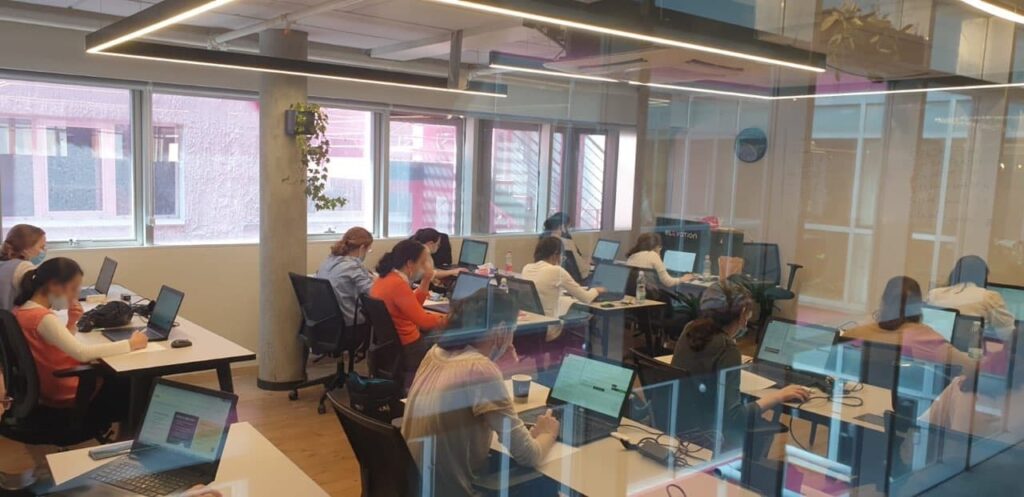The ultra-Orthodox community has long been severely underrepresented in Israel’s innovation ecosystem. A joint survey compiled by the Israel Advanced Technology Industries (IATI) with Haredi employment NGO KamaTech last year, showed that in 2018, ultra-Orthodox workers made up only about three percent of Israel’s entire tech workforce, though significant strides have been made in the past six years.
According to the report, ultra-Orthodox Jews working in the country’s tech sector had jumped 52 percent in the years 2014 to 2018, with women leading the way. Of the 9,700 Haredi tech workers that made up the industry, 6,900 of them were women.

Meanwhile, Israel continues to suffer from a chronic deficit of high-tech workers. Seeking to build on the soaring figures of ultra-Orthodox women entering the tech workforce, while addressing the high-tech industry’s human capital challenges, Start-Up Nation Central affiliate Scale-Up Velocity created Adva, a pilot program that trains female students enrolled in religious seminaries to become practical software engineers and high-tech developers.
Eighty-one women were part of the first group to graduate from the two-year program. By the program’s graduation event in December 2020, 13 had already secured jobs at tech firms such as Apple, Facebook, XM Cyber, and Check Point Software Technologies, according to program organizers.
As the world marks International Women’s Day, NoCamels has learned that a total of 32 students have found jobs in the tech ecosystem, or 40 percent of graduates.
The program is based on three “layers” of teaching including academic level, hands-on experience, and soft skills, or how to be interviewed and how to break into the hiring world, according to Anat Greemland, VP of Scale-Up Velocity. The program is equivalent to half of a computer science degree and intensive mathematics and computer science are taught by leading professors from top Israeli universities including Hebrew University, Tel Aviv University, Ben-Gurion University, and the IDC, who are in charge of the curriculum.

The program offers accelerated academics along with practical experience in conjunction with tech giants like Mobileye, IBM, Google, as well as the Ministry of Defense.
We are lucky to have these companies as board members,” says Greemland, “They created a profile of the kind of person they would like to hire as a high-tech developer and we took this profile and broke it into various teachings to create a training program.”
“They actually created a syllabus that was in line with the curriculum that they taught in their own classes as part of computer science programs in those universities,” she adds. “By the end of two years, our graduates had the knowledge of top university students. This was monitored by our advisory boards that were very hands-on with the training program.”
During the coronavirus pandemic, the program moved to a virtual format, which was challenging for many students who were not used to having internet at home. The students were assigned a computer and a “kosher” (restricted) internet network to continue their studies, participate in sessions, and meet experts from the tech industry who provided guidance and mentorship.
The program’s virtual graduation event for its first cohort took place last December, where Professor Eugene Kandel, CEO of Start-Up Nation Central, spoke about the significance of the program and why SNC has invested in it.

“We invested a hefty sum of NIS 10 million ($3.1 million) in the program, approximately NIS 125,000 for each student,” said Kandel at the event. Calculating the next 30 years’ worth of salaries just of the graduates who have already found jobs in the high-tech industry, “we reach NIS 25 million, 40 percent of which is expected to find its way back to the government as tax.”
“We identified the tremendous potential of the ultra-Orthodox women and realized that we could identify and train them. Their contribution to the economy cannot be overstated,” he added.
“The added value of the program to the industry is huge,” Mor Schlesinger, engineering manager at Google Israel and member of the Adva Steering Committee, said at the event. “It opens the door to unique groups” and makes it possible “to understand the unique needs and gaps that we at high-tech companies must be aware of.
Sign up for our free weekly newsletter
SubscribeAs the first cohort searches for positions in the high-tech sector, Adva’s second cohort of students are close to the end of their program. These students are expected to graduate in September 2021. For the second cohort, Scale-Up Velocity has “passed the baton” to the Jerusalem College of Technology. Jerusalem-based company and Intel subsidiary Mobileye will take over Adva, beginning with the third cohort, says Greemland.
SEE ALSO: Israeli Tech Industry Grows, But Employee Shortage Climbs to 18,500 — Report
“We’re here to create a program, run it as a model, and then hand it over to someone else, who will run it in a scalable way. We created this program in order to make sure that we show everybody, we proved that if this could work. We just need to make sure that someone else is running it from now on,” she explains.
Personal experience
The Adva program has been fully embraced by the religious leaders from the ultra-Orthodox communities, the company said in a graduation announcement.
Zahava, a 21-year old married ultra-Orthodox woman from Jerusalem, says she was also supported by her family as part of the first group of women that graduated from Adva. She became involved with the program after deciding she was interested in pursuing computer science.
Rather than calling it university, Zahava looked at it as a two-year extension of learning a subject after high school.
“So my goal was as getting a higher level of knowledge and this was basically university level, degree level, to get me further and to get me into higher high tech companies to work,” she tells NoCamels in a phone interview.
The program was “very hard and challenging, but it was enjoyable,” she says. “It was lots of work and lots of knowledge. It also gave us a lot of hands-on knowledge of programming. We’ve done lots of coding and projects with companies, which I like.”
Zahava is currently looking for a job as a software developer in programming languages like C++ and Python.
SEE ALSO: Pandemic Presents Opportunities, And Pitfalls, For Israeli Tech Sector — Report
“We must intensify efforts to further scale the relevant programs at universities and attract a much larger number of schoolchildren and young adults into STEM education,” Kandel tells NoCamels.
“At the same time, without a massive integration of women, Arabs and the ultra-Orthodox into the sector, there is little chance of providing the needed talent to the tech sector and significantly increasing the standard of living in Israel,” he adds.
Related posts

Editors’ & Readers’ Choice: 10 Favorite NoCamels Articles

Forward Facing: What Does The Future Hold For Israeli High-Tech?

Impact Innovation: Israeli Startups That Could Shape Our Future




Facebook comments